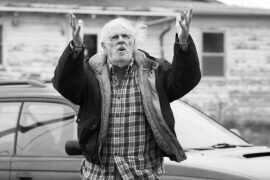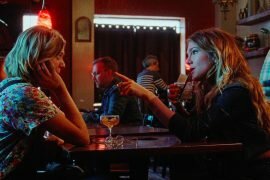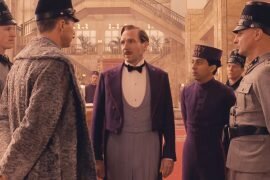Our life stories are positioned in a weave, not a line. Diverging from a tradition insisting that our lives are most comprehensible if plotted linearly, Jang Woo-jin’s film Autumn, Autumn reveals place as a character, interacting with the humans passing through it.

It is in a train that we first meet the three main characters. The noise of the train hinders fluid conversation, the characters caught in the state of open-ended transition familiar to travellers. Their common destination is Chuncheon; while the couple is going away on vacation however, the young man is returning home. Two consecutive sequences follow the parallel experiences of these characters over the course of two days. Although unlike films that might connect these threads, Jang Woo-jin does not frame the experiences in a conventional plot but examines two sets of interactions over the space of two days.
Having interviewed for a job in Seoul that he doesn’t get, Ji-hyun’s reaction is frustration and depression. Condemned to a place he calls a ‘shithole,’ we see him on a stone bridge in the natural light of street lamps, the sound of crickets filling the night. The image is beautiful but expresses isolation. Even more dramatic is the image in silhouette, a shadow on what looks to be a mountain of rubble. The next day, he is again in transit, taking a ferry to Cheongpyeongsa Temple, where he prays and then spends a day working in the restaurant of his friend’s mother. On the water, the light is bright but reflecting off the mist, it loses any golden hue and feels cold. At the temple, the colour again changes, the warm colours of the buildings, a softer light. Here Ji-hyun can reflect on his situation, confronting his disappointment.

Missing the ferry back to Chuncheon, he calls his old friend and apologises for not attending the funeral of his mother. The two young men laugh about memories of the past, but the laughter is sometimes troubled. Ji-hyun asks why his friend no longer sings, but his friend admits, he couldn’t “cut it.” Ji-hyung’s request that his friend sing a song over the phone is surprisingly tender. His friend replies, “I don’t usually sing for guys,” but in the end, after a bit of begging, he complies.
The couple moves through the same locations over the same period of time and is similarly affected by their environment. Arrival in the city is awkward and constrained. Like the city, they are not comfortable and conversation is halting. The next day in the harbour, we are again confronted with the bright but grayish light of misty air. Eating lunch, overlooking the harbour, they are now talking more fluidly, but it is not until they put aside their food after an admission that it is not very good that they seem to lose their shyness. Se-rang explains that she has been there many years previously and that the food was “not very good then either.”

Their ferry ride occasions the same kind of transition for them as it did for Je-hyun. Having arrived at the temple, Se-rang prays and afterward, we observe them enjoying a completely different meal at the restaurant we already know from Ji-hyun’s storyline. Location again interacts with the characters, the sunlight intermittently interrupted by passing clouds as they relate stories from their childhoods or talk about their marriages.
While there has been indication that they met through social media, it is here we are given explicit indication that this is an affair. Of her marriage, Se-rang says, “I’m not happy, but I’m not unhappy either.” Hyung-ju then admits that he barely knows his children. The tenderness of this short escape from their lives becomes visible. This is not a relationship as much as a mutual moment of relief from an emotionally, somewhat lonely, existence. When we see them return to Seoul, we are given an indication that this experience will dissolve into just another memory.

The description of events presented here might be a spoiler, if the point of the movie were a conventional plot or if the message of the film was explicitly portrayed in causal events or literally stated in words. However, the message of this film lies in the visual representations, the sounds, the expressions, and the feeling of the interaction and so cannot be spoiled by a description of the events. This is precisely its rebellion: by showing how authentic life is experienced, we realise it is a process in which we are always stuck in the middle.




